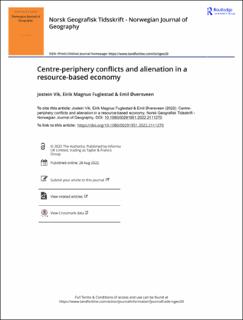Centre-periphery conflicts and alienation in a resource-based economy
Peer reviewed, Journal article
Published version

Åpne
Permanent lenke
https://hdl.handle.net/11250/3015461Utgivelsesdato
2022Metadata
Vis full innførselSamlinger
Originalversjon
10.1080/00291951.2022.2111270Sammendrag
Since the early 2010s, increased centre-periphery tensions have arisen across the Western Hemisphere and have had a significant influence on domestic policies. Analysts have explained this as an effect of economic inequalities and rural marginalisation. In this article it is argued that rural upheavals and centre-periphery conflicts can be caused by processes of alienation. The authors’ analysis is based on existing literature and statistics, as well as their own previously published research. From the case of Norway, they suggest that rural and peripheral upheavals can be explained as alienation caused by a combination of two different phenomena: ongoing transitions within the rural political economy of nature-based industries and sectors, and changes in the role of the modern welfare state, towards a state that in several key policy areas withdraws from the peripheries. Combined, these economic and political developments have produced a state of rural alienation and sharpening centre-periphery tensions, even in the absence of marginalisation and increases in economic inequality. In conclusion, the main argument of the article is that combined, such economic and political developments have produced a state of rural alienation and sharpening centre-periphery tensions, even in the absence of marginalisation and increases in economic inequality. Centre-periphery conflicts and alienation in a resource-based economy
